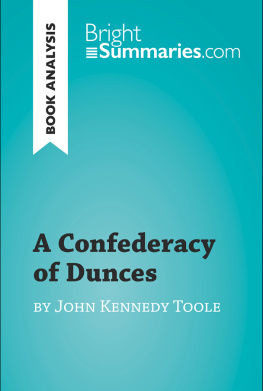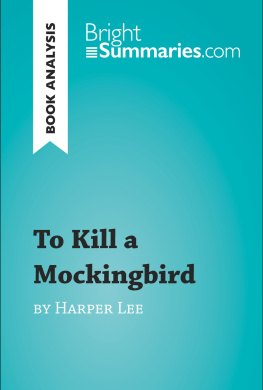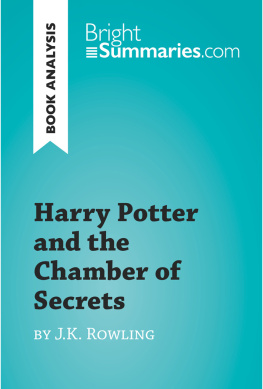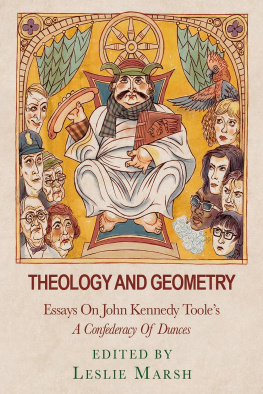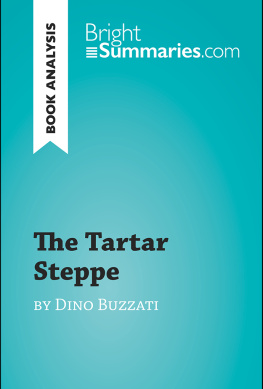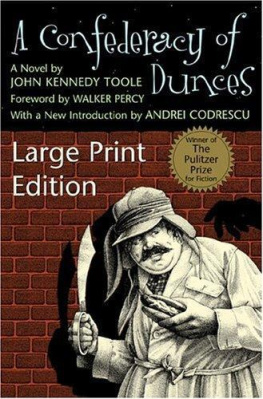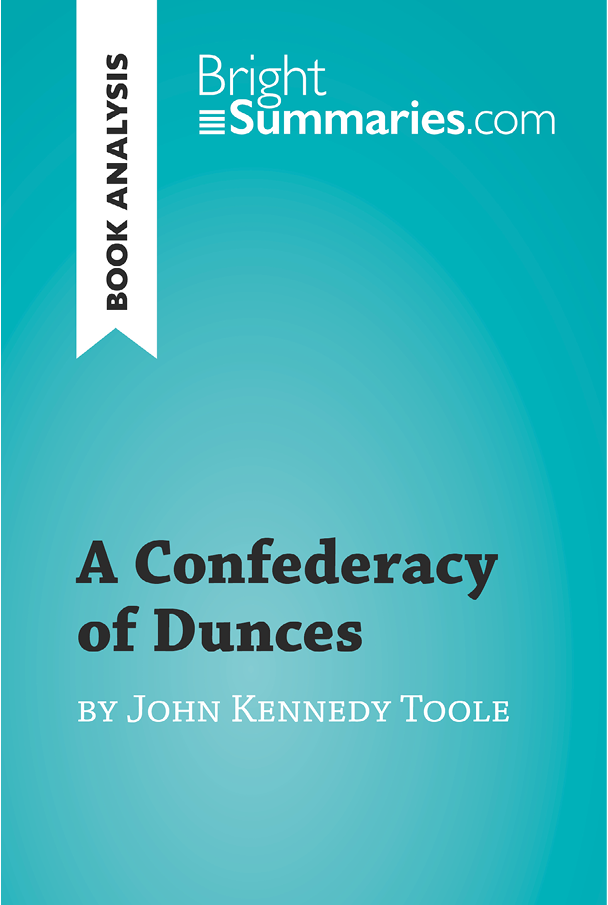


JOHN KENNEDY TOOLE
AMERICAN NOVELIST
- Born in New Orleans in 1937.
- Died in Biloxi (Mississippi) in 1969.
- Literary awards:
- Pulitzer Prize for Fiction, 1981 (for A Confederacy of Dunces ; awarded posthumously)
- Notable works:
- A Confederacy of Dunces (1980), novel
- The Neon Bible (1989), novel
John Kennedy Toole grew up in a middle-class environment which afforded him very few opportunities to exercise his creativity and often left him feeling suffocated. His mother was unable to help him overcome these issues, and he had a complex relationship with her: although they were very close, their relationship was characterised by conflict and rejection. However, she was the one who first introduced him to the world of art and literature by enrolling him in a comedic theatre class.
Kennedy Toole later attended Tulane University, after which he went on to study English at Colombia University. He also taught several university-level classes, and was fairly well-respected in the academic world. However, his career was interrupted when he was drafted into military service and deployed to Puerto Rico, although he continued teaching English Literature during his time there.
After completing A Confederacy of Dunces , Kennedy Toole submitted the manuscript to a number of publishers, but it was rejected every time. This left Kennedy Toole feeling depressed, paranoid and shut out of the literary world, and he decided to travel around the United States. After arriving in Biloxi, Mississippi, he committed suicide by connecting a hosepipe to his cars exhaust pipe and inhaling the carbon monoxide.
A decade later, his mother gave a copy of the manuscript of A Confederacy of Dunces to the publisher Walker Percy, as he recounts in his foreword to the novel:
But the lady was persistent, and it somehow came to pass that she stood in my office handing me the hefty manuscript. There was no getting out of it; only one hope remained that I could read a few pages and that they would be bad enough for me, in good conscience, to read no farther.
[]
In this case I read on. And on. First with the sinking feeling that it was not bad enough to quit, then with a prickle of interest, then a growing excitement, and finally an incredulity: surely it was not possible that it was so good. (pp. vii-viii)
Kennedy Tooles mother was therefore the one who eventually catapulted him to fame.
Early efforts
Kennedy Toole only ever wrote one other novel: The Neon Bible . It is set in an ordinary American town during the Second World War, and centres on a reclusive teenager who lives with his mother and aunt. All the men in the town have left to fight in the war, and all the women have gone to work in the factories. Any men who come back from the war become either religious fanatics or alcoholics, and the protagonist tries to escape this life.
Kennedy Toole came to hate this novel, which he considered excessively juvenile, and never seriously attempted to get it published. Although A Confederacy of Dunces is widely accepted to be his masterpiece, The Neon Bible is also worthy of critical recognition.
A CONFEDERACY OF DUNCES
A TALE ABOUT SOCIETYS UNDERBELLY
- Genre: picaresque novel
- Reference edition: Kennedy Toole, J. (1987) A Confederacy of Dunces . New York: Grove Weidenfeld.
- st edition: 1980
- Themes: alienation, poverty, work, politics
A Confederacy of Dunces is a fascinatingly unusual novel. It was so unique for its time that Walker Percy even commented on the responsible way it addressed racial tensions, eschewing stereotypes and the contradictory stances on these issues that still plagued the countrys political landscape.
The novels protagonist is Ignatius J. Reilly, an eccentric, ostentatious character who lives in New Orleans. He blindly believes in the benefits of a monarchy as a system of government and in medieval philosophy, and he therefore considers himself a bastion of morality. He fights constantly with his mother, who makes him take on a variety of menial jobs, where his implacable moral beliefs lead him to influence, annoy and scorn his employers and colleagues.
Eventually, the cycle of confrontations that has come to define Ignatiuss life becomes unsustainable, which has a marked effect on both his physical appearance and his beliefs.
SUMMARY
A DECADENT PARTY IN NEW ORLEANS
Ignatius J. Reilly is patiently waiting for his mother to finish her shopping when a police officer called Angelo Mancuso suddenly begins questioning him, because Ignatiuss comical hunting cap, ridiculous moustache and tremendous obesity make him seem like a suspicious character. Ignatius is saved by Claude Robichaux, an elderly man obsessed with communism, who thinks that the policeman is bothering Ignatius and attacks him. A few moments later, Ignatiuss mother Irene arrives, and the two of them leave while Mancuso arrests Robichaux.
The Reillys end up in a strip club called Night of Joy. They are acquainted with Darlene, one of the waitresses who works there, and her tyrannical boss Lana Lee, and chat to both women. However, Ignatiuss presence makes the bars other customers feel very uncomfortable, as he keeps burping and smells very bad.
After leaving the bar, Ignatius and Irene look for their car amid all the hustle and bustle of New Orleans, where the sweltering streets are full of drunkards and partygoers in full costume. They find the car and Irene gets into the drivers seat, but she has had too much to drink and crashes the car in front of a building. The owner comes out to yell at the Reillys, but Mancuso arrives on the scene and manages to defuse the situation before it gets any worse. However, he tells them that they will have to pay the owner for the damages.
Setting the scene
A Confederacy of Dunces has been lauded for more than just its comedic touches; it is also widely regarded as an exceptionally comprehensive overview of all the social groups living in New Orleans and their unique ways of speaking, as the novels characters include policemen, working-class labourers, prostitutes, and people from the citys black, Italian, Irish and Latino communities, among others. The novels epigraph even claims that New Orleans has more in common with the coastal cities of the Mediterranean than with cities like New York. While it is not the main subject of the novel, the citys cosmopolitan and multicultural character nevertheless plays an important secondary role in it.
THE PATRON SAINT OF LOST CAUSES
Now that the family has been saddled with a large debt, Irene tells her son that he will have to get a job. Ignatius initially refuses, as he believes that he is better suited to spirituality, intellectualism, writing and watching television than working a normal job, but he eventually agrees, and starts looking for work. In the end, he gets a job at Levy Pants, a company which produces jeans. Ignatiuss job involves managing the company archives, but he also embarks on an ethical crusade to improve the way the company works. The company is mostly run by Gonzalez, a mediocre but punctual office manager, and Miss Trixie, an eccentric secretary, while the owner is almost entirely uninvolved. Ignatius tries to persuade the black factory workers to protest against the boss, Mr Levy, and eventually convinces them by performing a ridiculous dance in front of them. He also sends a letter full of insults to one of the companys suppliers and forges Mr Levys signature at the bottom of it. Meanwhile, the workers learn that Ignatius once had a run-in with the police and lose faith in him, so the protest is cancelled. Ignatius is fired shortly afterwards.

